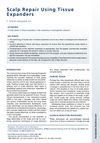 10 citations,
March 2015 in “PubMed”
10 citations,
March 2015 in “PubMed” Scalp micropigmentation, a cosmetic tattoo technique, is a promising non-surgical treatment for hair and scalp deformities, despite potential complications.
 88 citations,
January 2013 in “Indian Journal of Dermatology, Venereology and Leprology”
88 citations,
January 2013 in “Indian Journal of Dermatology, Venereology and Leprology” Minoxidil and finasteride effectively treat hair loss.
 8 citations,
November 2022 in “International Journal of Cosmetic Science”
8 citations,
November 2022 in “International Journal of Cosmetic Science” Human hair varies widely and should be classified by curl type rather than race.
[object Object]  1 citations,
January 2019 in “Clinical, Cosmetic and Investigational Dermatology”
1 citations,
January 2019 in “Clinical, Cosmetic and Investigational Dermatology” Jarilla-Coffea extract gel effectively and safely increases eyelash and eyebrow thickness in women.
 November 2017 in “Elsevier eBooks”
November 2017 in “Elsevier eBooks” PCOS is a genetic disorder affecting women's reproductive health, with treatments focused on symptoms like insulin resistance and fertility.
 November 2013 in “John Wiley & Sons, Ltd eBooks”
November 2013 in “John Wiley & Sons, Ltd eBooks” Skin symptoms can indicate endocrine disorders and have various treatments.
 1 citations,
December 2022 in “Middle East Journal of Science”
1 citations,
December 2022 in “Middle East Journal of Science” Permanent hair dyes use chemicals that react with hydrogen peroxide to create color.
 11 citations,
August 2013 in “Facial Plastic Surgery Clinics of North America”
11 citations,
August 2013 in “Facial Plastic Surgery Clinics of North America” Tissue expanders effectively repair large scalp defects and restore a natural-looking scalp.
 December 2024 in “Journal of Dermatological Treatment”
December 2024 in “Journal of Dermatological Treatment” Early treatment can help reverse hair loss caused by cosmetic fillers.
 3 citations,
January 2021 in “Wear”
3 citations,
January 2021 in “Wear” Hair's resistance to wear varies by ethnicity and treatment, with less wear indicating stronger hair.
 March 2017 in “The American Journal of Cosmetic Surgery”
March 2017 in “The American Journal of Cosmetic Surgery” Transplanted hair follicles can resist hair loss from an autoimmune condition better than natural hair.
 1 citations,
October 2023 in “International journal of Ayurveda and pharma research”
1 citations,
October 2023 in “International journal of Ayurveda and pharma research” Herbal medications might be safer and more effective for hair loss than synthetic treatments.
 7 citations,
November 2017 in “Plastic and reconstructive surgery. Global open”
7 citations,
November 2017 in “Plastic and reconstructive surgery. Global open” FUE and SMP together can effectively treat hair loss, needing fewer procedures.
 January 2024 in “International journal of homoeopathic sciences”
January 2024 in “International journal of homoeopathic sciences” Homeopathic treatments can effectively manage hair loss and improve well-being.
 December 1989 in “The Journal of Dermatologic Surgery and Oncology”
December 1989 in “The Journal of Dermatologic Surgery and Oncology” New techniques and findings in dermatologic surgery show improved pain management, safer liposuction, better hair transplantation, and effective treatments for skin conditions.
 21 citations,
January 2012 in “Annals of Dermatology”
21 citations,
January 2012 in “Annals of Dermatology” 17α-Estradiol solution safely improves hair density and thickness in female pattern hair loss.
 2 citations,
June 2016 in “Journal of skin and stem cell”
2 citations,
June 2016 in “Journal of skin and stem cell” Wet cupping blood has different components than regular venous blood, which might affect skin disorder treatments.
[object Object]  1 citations,
July 2018 in “Elsevier eBooks”
1 citations,
July 2018 in “Elsevier eBooks” Avoid chemical and physical damage to protect hair.
 3 citations,
February 2023 in “ACS omega”
3 citations,
February 2023 in “ACS omega” Grape seed oil improved hair quality the most, followed by rosehip and safflower seed oils, and reduced damage from shampoo.
 10 citations,
January 2012 in “Journal of biomedical optics”
10 citations,
January 2012 in “Journal of biomedical optics” Melanin density affects hair color, and this method can help in cosmetic assessments and diagnosing hair diseases.
 32 citations,
January 2018 in “American Journal of Clinical Dermatology”
32 citations,
January 2018 in “American Journal of Clinical Dermatology” Hormone therapy affects hair growth in transgender individuals, with testosterone potentially causing hair loss in trans men and estrogen reducing facial/body hair in trans women; treatment options vary.
 6 citations,
January 2017 in “Annals of Dermatology”
6 citations,
January 2017 in “Annals of Dermatology” Combination of 17α-estradiol and minoxidil improves hair growth and reduces hair loss in most patients.
 August 2023 in “International Ayurvedic medical journal”
August 2023 in “International Ayurvedic medical journal” Improper diet, lifestyle, and stress are major causes of hair fall.
 May 2024 in “Journal of cosmetic dermatology”
May 2024 in “Journal of cosmetic dermatology” Heat-treated Limosilactobacillus fermentum with menthol, salicylic acid, and panthenol promotes hair growth and balances scalp microbiome in people with androgenetic alopecia.
July 2024 in “International Journal of Molecular Sciences” RF-based therapies might help treat hair loss.
 July 2021 in “British Journal of Dermatology”
July 2021 in “British Journal of Dermatology” Low testosterone levels may contribute to female pattern hair loss in men.
 1 citations,
October 2008 in “Expert Review of Dermatology”
1 citations,
October 2008 in “Expert Review of Dermatology” Frontal Fibrosing Alopecia is a slowly progressing hair loss condition, likely underdiagnosed, with ineffective treatments, needing more research to understand it fully.
 November 2022 in “Bioengineering”
November 2022 in “Bioengineering” The method can test hair growth products using a lab-made hair-like structure that responds to known treatments.
 51 citations,
July 2008 in “Dermatologic Therapy”
51 citations,
July 2008 in “Dermatologic Therapy” The document concludes that surgery is a preferred treatment for cicatricial alopecia, with the method chosen based on individual factors and may require multiple sessions and careful postoperative care.
 September 2004 in “Atlas of the Oral and Maxillofacial Surgery Clinics”
September 2004 in “Atlas of the Oral and Maxillofacial Surgery Clinics” Hair restoration surgery techniques can effectively treat scalp deformities and have evolved to provide natural-looking results.





























